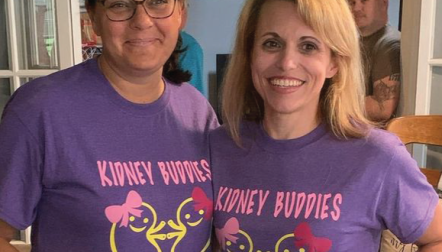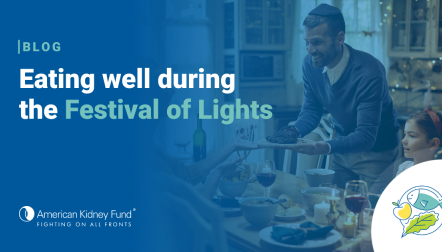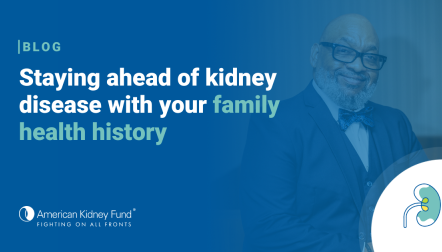
Blog post
Ambassador spotlight: Leigh-Ann Williams

What made you want to become an AKF Ambassador?
I became an American Kidney Fund Ambassador to advocate for, educate and empower other kidney patients. As a young dialysis patient who tries to stay as active as possible, I realized the importance of providing encouragement to other patients so they know that their life does not have to end because of a kidney disease diagnosis. I wanted to encourage patients of all ages to advocate for themselves and be actively involved in their health care decisions. Lastly, I wanted to educate people about kidney disease, its risk factors and symptoms, and the challenges people living with kidney disease face.
How has being an Ambassador helped you?
Being an Ambassador has helped me expand my platform and reach more people. AKF provides us with many resources and opportunities to make a real difference in the lives of people living with kidney disease. I have been able to advocate in my local community and I have even been able to meet with my lawmakers on Capitol Hill, thanks to AKF, so I can make sure they are aware of the patient experience and the need for legislation that would improve the quality of life for people like me.
What have you learned from being an Ambassador?
I have learned more than I did before about the resources and opportunities available to help kidney patients through their journey with kidney disease. From information on what the kidneys do and what kidney disease is, to learning about grants and scholarships available for us. AKF keeps Ambassadors up to date on issues that impact the kidney disease community, so we can share that information with others in our network as well.
Why should others become Ambassadors for AKF?
Kidney disease is the ninth leading cause of death in the United States, and while some kidney diseases are genetic, there are things many people can do to slow down the progression of kidney disease or prevent it altogether. The more people who become aware of how to manage their kidney health and who educate others on how to do the same, the more we are able to work to reduce the number of people suffering from this disease.
What is something you've learned about kidney disease and dialysis that you wish you knew a lot sooner?
I wish I knew sooner the things that I could have done to prevent my kidney disease from progressing to kidney failure so rapidly. Taking care of your body and eating the right foods are two great ways people can reduce their risk or slow down the progression of existing kidney disease.
How do you like to stay connected to other Ambassadors?
I am very social and love to meet new people, especially those who are also in this fight with me advocating for kidney disease. I love to meet people in person, but I am also very active on social media — feel friend to friend and/or follow me on Facebook, Instagram, Twitter and LinkedIn until we can meet up in person in a post-COVID-19 world. I look forward to a time when we can advocate and congregate in person to push beneficial kidney initiatives.
What do you wish elected officials knew about dialysis patients?
Dialysis patients are resilient people. Kidney failure is a completely life-altering disease. It changes not only your life, but also the lives of those closest to you. It takes a village — we need support and resources to improve our quality of life because dialysis is taxing on the body and the mind.
Do you have any advice for newly diagnosed kidney patients?
Do not give up! There is so much to learn and know when you first get a diagnosis, and it requires big lifestyle changes. I am someone who loves to plan things out, so dialysis is something I have to factor into everything I want to do. It is important to know that you can still do the things you enjoy; it just takes additional planning. Do not give up and always be involved in your kidney care. Know your lab numbers, talk to your doctors and nurses, and learn as much as you can from every resource available — AKF has a ton of information on their website. It may be overwhelming and you may feel defeated at first, but kidney disease is not a death sentence. There are people who have lived with this disease for many decades! The key is to stay educated, stay active in your kidney care and never, ever give up!
How does it help to have a family member be part of the process?
It is so important to have support throughout your kidney disease journey. I am so grateful for my family, friends and support system, who I affectionately call Team Leigh-Ann. They encourage me, support me and keep me uplifted when things get hard. As a home dialysis patient, I am lucky to have three family members who have been trained as care partners, so when my travel takes me out of town or even out of the country, I always have someone who can travel with me to assist with my necessary dialysis treatments. My care partners have done dialysis with me at all times of the day and night to accommodate my hectic schedule, and I am forever grateful for their willingness to stand by and support me through this process.
What are some interesting facts about yourself that you would like to share?
I spent 16 months as an in-center dialysis patient. During that time, I was the international third vice president of a nonprofit organization, so I had to travel to 19 different dialysis clinics for treatment while out of town for work. I recently received my Master in Public Health with a concentration in epidemiology, and my career interests are in reducing health disparities that lead to disproportionately high rates of chronic diseases, like kidney disease, in minority communities.





